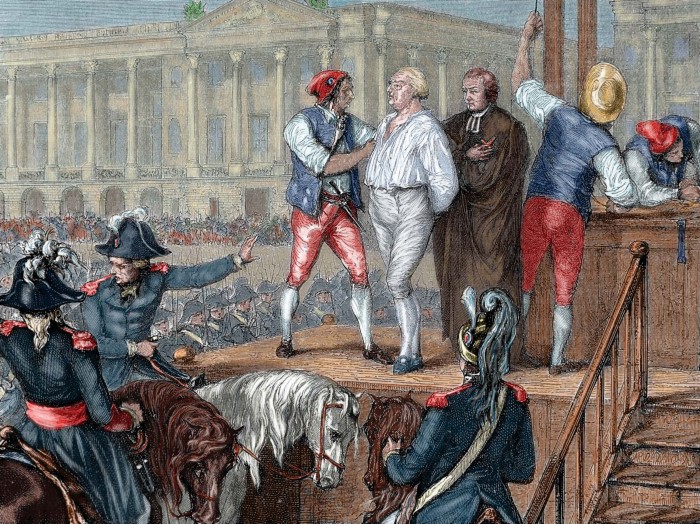In 1979 there was a political upheaval in the roads of French for what was assumed to be an unfair and unequal system. Lack of resources, mismanagement, and poverty led the crowd into a series of rebellious acts on what would be the start of the French revolution. The revolt was more than a local event restricted in the realms of the city or even France itself. It led to the destruction of the previously established system of feudalism and brought forth many new movements to advance more liberal ideas in society and the whole. It was the first time that Ideas like equality and liberty took their foot on the world at such a massive scale and became the focal point of the people.
The Feudal Society
Feudalism emerged out of necessity. Although all power and land belonged to the King, the lack of military power and resources forced them to hand down parts of their ownerships in exchange for military services. As opposed to other systems, and even to its evolution as it came later, Kings could not afford to sustain the city from all the outer threats without the help of the noble people and their armies. And so land was divided into smaller parts that were passed on to them to manage as they please in return for services. And nobility, on its side, allowed the lower layer of society, to work on them, in exchange for money and food, and this continued all the way down to peasants that would have to work on the land all day long for minimal compensation.
Residues of the feudal system exist in some form even today in the sense of resources. People with enough money can allocate funds to acquire infrastructure on which less wealthy people can work in it, with most of the time worse conditions than they would deserve. It’s the prototype of many modern businesses that capitalize on the hard labor of people to gain huge amounts of surplus value from them.
The Feudal Revolution
With time feudalism evolved into a system where property was divided into multiple smaller regions on which the ruling nobles gained more and more power. The various lands gained a hereditary quality that was passed from one generation to the next, for which their distribution had more of a political role. This decentralization of the empire was at its core of the feudal evolution and power was distributed to many independent parts.
The French revolution opposed the previous rules of who is the ruler and transferred power to the hands of the public. The ‘Republic’ that was established immediately after has the meaning of taking control from the Kings and allocating it to the people of the country, thus establishing the right form of order. It is the opposite form of monarchy and allows more people the right to make decisions and influence matters.
Republic and monarchy were established interchangeably through the coming of Napoleon and the general political turmoil. But at its core, the evolution was always trying to eradicate the ruling of the King and establish a different order where ideas of enlightenment would have the primary role.
The Tricolour Flags And Republicanism
The tricolor flags, that emerged in Europe in the 16 century, were a symbol of the liberal ideas, that denoted the establishment of republicanism and equality. The design of them would always be 3 vertical or horizontal lines of equal width and their colors would change in each case depending on the various symbolisms underpinning their values. But one cannot help but suspect that the 3 lines have their origins on the 3 main ideals of the French revolution itself: Liberty, Equality, and Fraternity.
The Difference Between Democracy And Republicanism
The Athenian democracy was one of the few true democracies. People would be allowed to influence matters through their direct vote as they would commence laws following the order of the majority. But this is the difference between a republic and a democracy as in the republic minorities are still protected through the representative power that is obliged to protect their rights when in democracies, all minorities lose any sign of power. Obviously, the term ‘minorities’ in this context of politics, denotes mostly the privileged minorities and not the suppressed ones, as the rich tried to preserve their rights on properties and resources.
The fear of “majority tyranny” was a common theme in the 17th century and later, even among those who were sympathetic to democracy. Given the opportunity, it was argued, a majority would surely trample on the fundamental rights of minorities. Property rights were perceived as particularly vulnerable, since presumably any majority of citizens with little or no property would be tempted to infringe the rights of the propertied minority. — Britannica
Another Kind Of Evolution
At the same time that France was going through this political upheaval, England was setting the base for another major change in society’s state, the industrial revolution. Even though they happened at the same time and they both had a permanent influence on the world, the industrial revolution was totally different in nature and to some degree even opposite to the French one.
The industrial revolution brought worse conditions to the majority of people who moved away from the farms and got locked inside the factories with minimal income and extreme working conditions. The agricultural development which drove humanity in all previous years gave its way to a new economy where products and mass consumption would gain ground day by day. Even though in France people were fighting for their rights and equality, the Industrial Revolution in England led to the opposite direction allocating more money to the rich and worsening the status of the poor.
“French revolution was political in nature while the industrial one was economical”
The Birth Of Sociology
In 1838, Auguste Comte, was the first one who sought to set a stronger base on the various forces within society, using a more scientific and respected approach. He thought that in the same way, physicists could run their experiments and come up with laws, the scientific analysis could be used in society as well. In a way, sociology stood behind all the general upheaval that was taking place within the realms of society and analyzed all the political and economical consequences that were observed inside it.
As the main weapon of analysis, sociology took on every matter within the realms of society that affected its cohesion and well-functioning. Racism, conflicts between groups or classes within it, education, inequality, and so on. It tried to understand how its components played out in relation to each other and how people could set better fundamentals for their well-being.
Sociology naturally expands beyond the human factor and goes well into the realm of politics and its intricacies. More specifically,
“The sociological interest in political systems is figuring out who holds power within the relationship of the government and its people and how the government’s power is used. There are three types of political systems that sociologists consider: Authoritarianism, Monarchy, and Democracy” — Wikipedia
The discipline emerged in a way to analyze the ways through which you can organize society to promote better the interests of its members and individuals. And beginning from the French revolution we can see how the movement pushed forward people to strive stronger for their rights and bring a better equilibrium to their lives.
0



